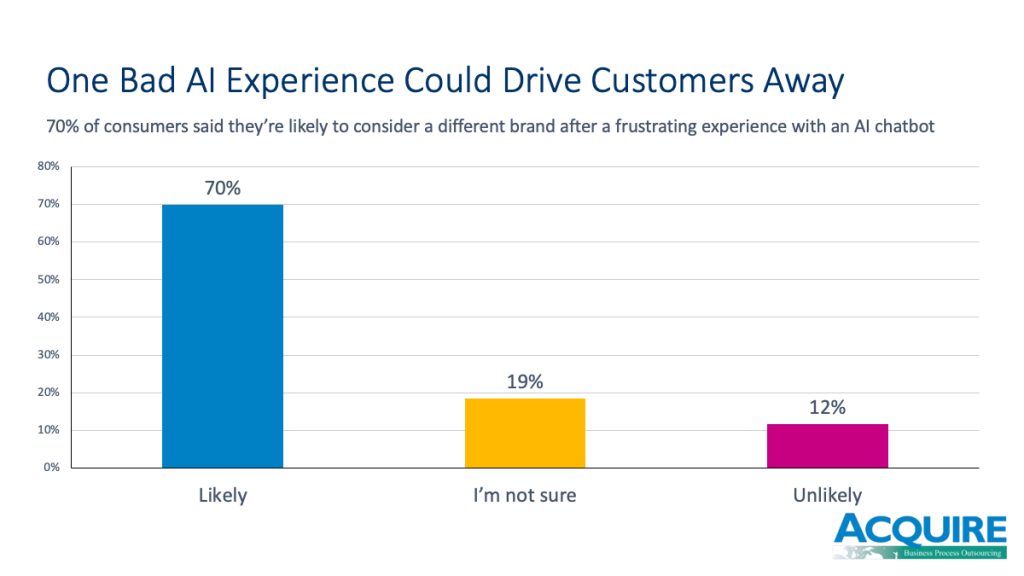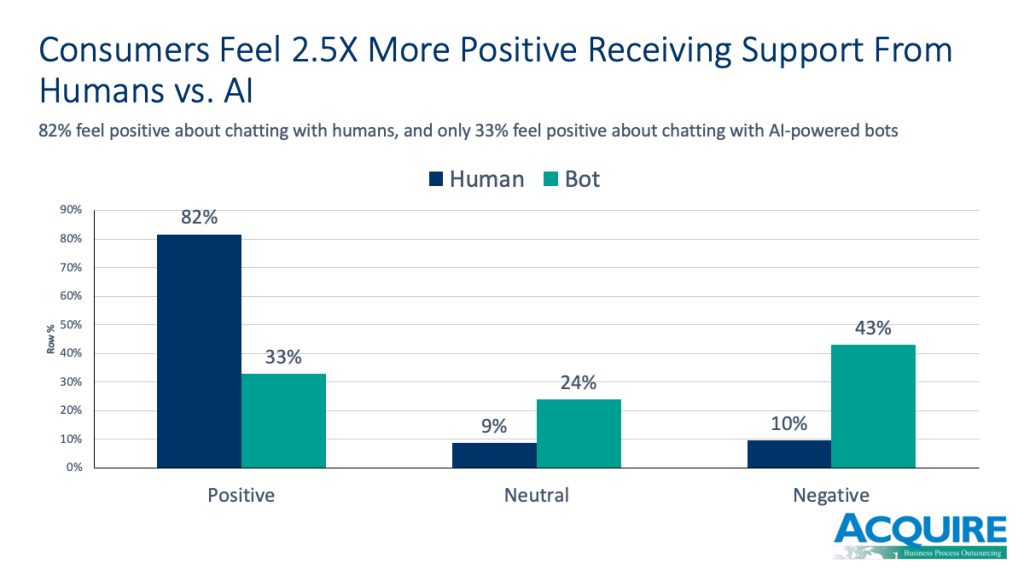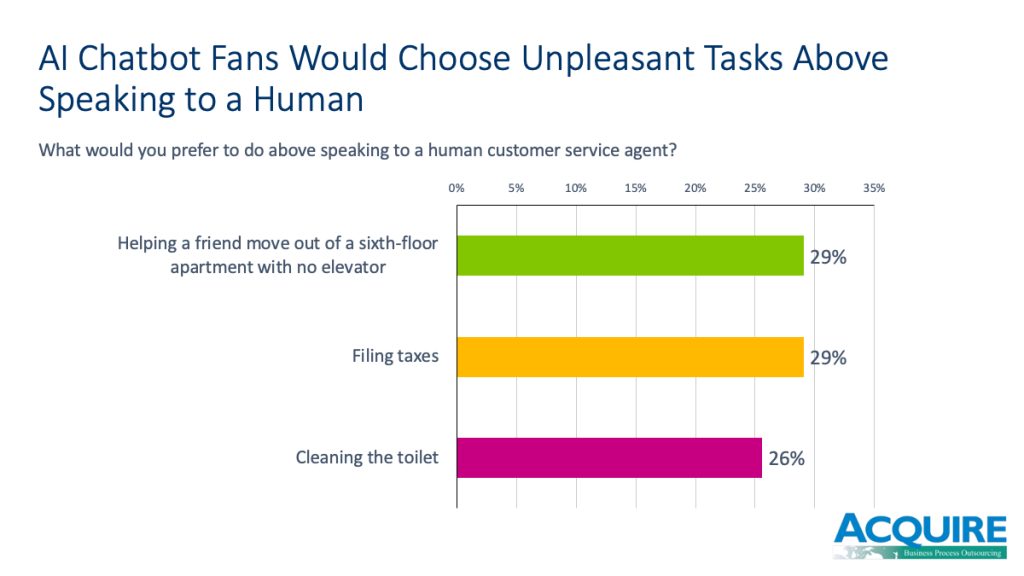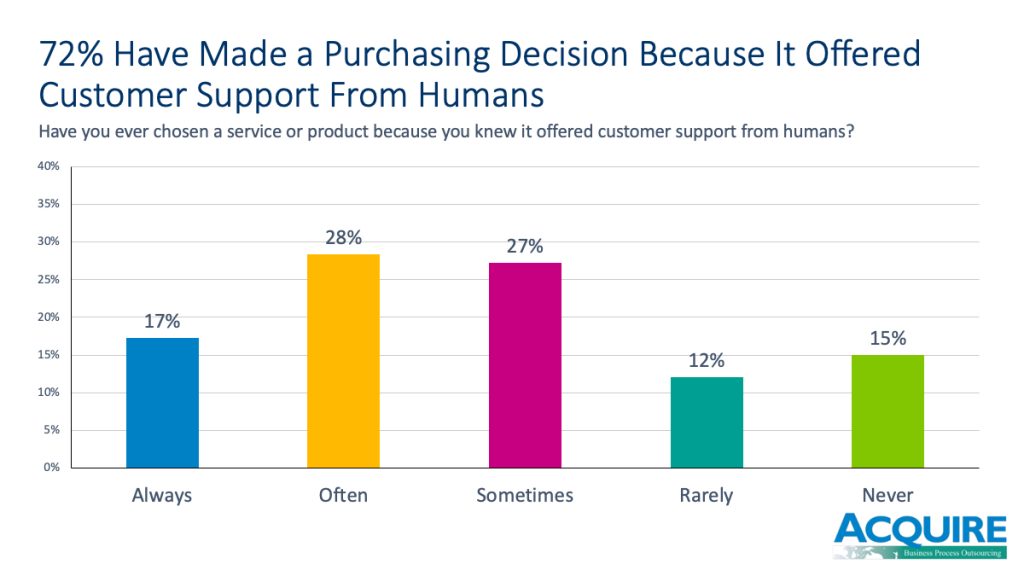70% of consumers would consider a different brand after one bad AI customer service experience, according to a new survey from Acquire BPO
Purpose of the Study
From the popularization of AI chatbots in the early 2000s to today’s conversational AI that is strikingly human, AI adoption in customer service continues to grow, sparking strong reactions and debate among business leaders and customers alike.
The allure of AI-powered chatbots is undeniable with its around-the-clock service, fast response times, and ability to handle simple queries at scale. But, as soon as a customer experiences frustration, a sour experience can start to chip away at long-term loyalty–or, even worse, cause the customer to completely abandon the brand.
Returning to fully-human customer support isn’t a viable option for many companies, but it still begs the question: has the rise of AI-generated customer service led to a precipitous decline in customer experience? And how can a company harness the strengths of both humans and AI while scaling for growth?
Acquire BPO, a global leader in customer experience and business process outsourcing, partnered with the third-party survey platform Pollfish to explore consumer sentiment insights and how companies can proactively map out their AI customer experience strategies to ensure positive interactions. Pollfish surveyed the experiences of 600 U.S. consumers aged 18+ who contacted a company for support issues over the past year. Below are the results of the Acquire BPO 2024 AI in Customer Service Survey.
Key Findings
- 70% of consumers would consider a different brand for their next purchase after just one frustrating experience with AI-supported customer service.
- Consumers are 2.5X more positive about their experience chatting with humans versus AI-powered bots.
- Half of consumers feel negatively about companies relying more on AI for customer support, citing downsides such as the lack of personal touch, decreased accuracy and longer resolution times.
- Consumers are willing to put their money behind their preferences, with 57% of chatbot fans saying they’ve chosen a service or product because they knew it offered chatbot support, and 72% of those with a human preference saying the availability of human customer support factored into their buying decisions.
- Many chatbot fans would rather complete an unpleasant or inconvenient task instead of speaking to a human customer support agent, with 29% saying they’d rather file their taxes, 29% saying they’d rather help a friend move out of a 6th floor apartment with no elevator, and 26% saying they’d rather clean the toilet.
- 40% of consumers are confident in AI’s ability to handle simple issues as well as a human, and 49% said they’d feel more comfortable using AI-powered support if they had the ability to switch to a human agent at any time.
The Battle of AI vs. Human in Customer Service
As companies increasingly turn to AI-powered customer service to reduce costs and increase efficiency, the survey found that companies could risk alienating a large portion of their customer base if the customer experience is compromised because of it.
When asked how likely they’d consider a different brand after a frustrating experience with an AI chatbot, 70% of consumers said they’d take their business elsewhere after just one bad experience. Companies only have one shot at getting it right, underlining the importance of mapping out a strong AI deployment strategy.

The battle between AI-powered vs. human-powered customer service is being played out in stark numbers, with an overwhelming number of individuals preferring support from humans. People felt 2.5 times more positive about their experience chatting with humans vs. AI-powered chatbots, with 82% feeling positive about chatting with humans, and only 33% feeling positive about chatting with AI-powered bots.

The resistance to AI isn’t just about preference; individuals perceive that they’ll receive subpar service and harbor negative feelings towards companies that increase their use of AI.
Nearly 50% of consumers said they have negative feelings about companies relying more on AI for customer support. When asked about the reasons driving this sentiment, respondents cited factors such as losing the personal touch, decreased accuracy and longer resolution times.
Navigating the Landscape of Consumer Preferences
The combination of strong positive preference for human support and a strong negative perception of AI create a challenging landscape for companies looking to deploy AI-powered solutions in a customer-centric way. To do so effectively, leaders must be mindful of what customers see as the benefits and downsides of humans vs. AI.
Less than 5% prefer to interact with an AI-powered bot, with those who do valuing the availability and speed it offers. 45% appreciate the round-the-clock availability, and 44% favor the quick response times.
Those who prefer AI-powered bots feel very strongly about their preference, with 57% saying they’ve chosen a service or product because they knew it offered chatbot support. This preference runs deep, with chatbot fans saying they would choose it above a human no matter what–even if it meant completing an unpleasant or inconvenient task instead. When asked what they would choose to do instead of speaking to a human customer support agent, 29% said they’d rather file their taxes, 29% said they’d rather help a friend move out of a 6th floor apartment with no elevator, and 26% said they’d rather clean the toilet.

But for a vast majority of consumers, the human touch remains paramount. Respondents who indicated a preference for customer support from humans cited reasons such as the ability to handle unexpected questions, offer personalized solutions, and understand nuance and context.
In fact, 72% said they’ve chosen a service or product because they knew it offered customer support from humans, with 45% saying that human support is a critical factor in their purchasing decision.

How can Companies Incorporate the Best of Both Worlds?
Knowing that just one bad AI-powered support experience could drive customers away, companies need to be thoughtful when deploying AI across the customer experience.
To maximize AI’s benefits while avoiding its pitfalls, use it judiciously for the right tasks–and do the same for your human agents as well.
- Don’t be afraid to use AI to address simple requests. 40% of consumers were confident in AI’s ability to handle simple issues as well as a human, presenting an easy opportunity for companies to streamline a portion of their support workload.
- Use AI to reference past issues–but don’t go too far in predicting future issues. 61% of survey respondents liked the idea of AI remembering past issues in order to streamline future contact with customer support, however 50% responded negatively to AI being used to predict problems before they happened.
- Use AI to escalate issues. 55% of consumers responded positively to knowing that AI could detect frustration with sentiment analysis and help route them to a resource or human agent to help with more complex issues.
- Provide clear paths for customers to request a human agent. 49% of customers said they’d feel more comfortable using AI-powered support if they had the ability to switch to a human agent at any time.
“Unlocking the power of AI is essential for companies to gain a competitive edge, however the future of exceptional customer service requires striking the right balance between AI and human support,” said Scott Stavretis, CEO of Acquire BPO. “By carefully mapping out an experience that blends AI and human support seamlessly, brands can meet customers where they are and deliver consistently outstanding service across all touchpoints.”













